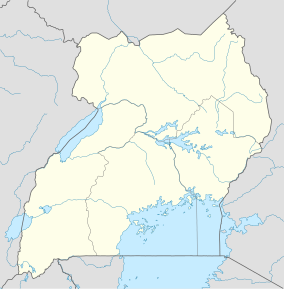Ihimbo Central Forest Reserve
| Ihimbo Central Forest Reserve | |
|---|---|
| Ihimbo Forest | |
| Location | Rukungiri District,Western Region, Uganda |
| Coordinates | 0°40′0″S 29°49′59″E / 0.66667°S 29.83306°E |
| Area | 4.77 square Kilometers |
| Governing body | National Forestry Authority (NFA) |
Ihimbo Central Forest Reserve, located in western Uganda,[1][2] is one of the protected forest reserves in Uganda which is found in Rukungiri district. The Forest Reserve is situated near the villages of Bwambara and Kikongi. The forest reserve is endowed with natural herbs that are medicinal and cure ailments in the human body and managed by National Forestry Authority. The forest reserve was gazetted in 1965.[2]
Setting and structure[edit]
Ihimbo Central Forest Reserve covers a total of 4.77 km2.[2]
It is located at latitude 0° 40' 0" South and longitude 29° 49' 59" East.
Medicinal plants[edit]
Ihimbo Central Forest Reserve is well known for its medicinal[3][4] purpose that it plays in the lives of local communities living around the forest. The forest covers communities like Bwambara,[5] Kikarara, Rwenshama, Nyabubare and Kikongi. All these parishes are found in Bwambara sub-county in Rukungiri district, South Western Uganda.[5] The plants found in this forest reserve include commonly used medicinal[6] plants[7] such as Asteraceae, Fabaceae, Solanaceae, Lamiaceae, Poaceae and Eurphobiaceae with 26, 21, 12, 21, 11 and 10 species cited respectively as documented in the research findings of Mbarara University for Science and Technology.[8][9]
Language[edit]
The language widely spoken by communities around Ihimbo Central Forest Reserve is Runyankole/ Kiga.[10][11][12]
Controversies[edit]
The key challenges facing the forest reserve are crosscutting. According to a study conducted by Mbarara University for Science and Technology,[8][3] the challenges facing Ihimbo Central Forest Reserve include destruction for farmland, poaching, encroachment, human settlements, illegal extraction of park resources and political pressure to de-gazette park land, Hunting of bush meat, illegal harvesting of timber and other plant products, charcoal making, encroachment for farmland mining, political pressure to de-gazette or change the land use of forest reserves. The 108 km2 of the forest has been cleared for eucalyptus tree planting.[3]
See also[edit]
References[edit]
- ^ "Best Hiking Trails in Ihimbo Central Forest Reserve". GaiaGPS.com. Retrieved 2023-05-19.
- ^ a b c "Protected Planet | Ihimbo". Protected Planet. Retrieved 2023-05-19.
- ^ a b c "Medicinal plant species used by local communities around Queen Elizabeth National Park, Maramagambo Central Forest Reserve and Ihimbo Central Forest Reserve, South western Uganda - PDF Free Download". coek.info. Retrieved 2023-05-19.
- ^ Gumisiriza, Hannington; Birungi, Grace; Olet, Eunice Apio; Sesaazi, Crispin Duncan (2019-07-15). "Medicinal plant species used by local communities around Queen Elizabeth National Park, Maramagambo Central Forest Reserve and Ihimbo Central Forest Reserve, South western Uganda". Journal of Ethnopharmacology. 239: 111926. doi:10.1016/j.jep.2019.111926. ISSN 0378-8741.
- ^ a b "Medicinal plants used to treat" African" diseases by the local communities of Bwambara sub-county in Rukungiri District, Western Uganda". scholar.google.com. Retrieved 2023-05-19.
- ^ Gumisiriza, Hannington; Birungi, Grace; Olet, Eunice Apio; Sesaazi, Crispin Duncan (2019-07-15). "Medicinal plant species used by local communities around Queen Elizabeth National Park, Maramagambo Central Forest Reserve and Ihimbo Central Forest Reserve, South western Uganda". Journal of Ethnopharmacology. 239: 111926. doi:10.1016/j.jep.2019.111926. ISSN 1872-7573. PMID 31067488.
- ^ "Medicinal plant species used by local communities around queen elizabeth national park, maramagambo central forest reserve and ihimbo central forest reserve, south western Uganda". scholar.google.com. Retrieved 2023-05-19.
- ^ a b "Home". Mbarara University of Science & Technology. Retrieved 2023-05-21.
- ^ "Executive order No3: Museveni bans charcoal trade, guides on the Balaalo". Monitor. 2023-05-25. Retrieved 2023-05-29.
- ^ "Kiga language". omniglot.com. Retrieved 2023-05-21.
- ^ "Is Runyankore-Rukiga dying together with the language icons?". New Vision. Retrieved 2023-05-21.
- ^ "Runyankole Translation Services | English to Runyankole Translations |". translate4africa. Retrieved 2023-05-21.

